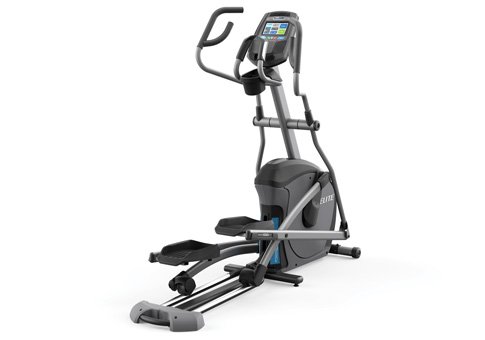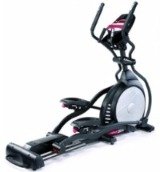Elliptical Trainer FAQs – Answers to Most Common Questions from Our Readers
Buying your first elliptical or troubleshooting your machine usually requires reviewing a few elliptical trainer FAQs. We’ve focused on the issues that we hear about most often from feedback from our readers as well as the problems raised most often by elliptical users.
Should I Go With a Front Drive or Rear Drive Elliptical?
This is one of the most frequently asked questions on elliptical trainers. Most club models are rear drive because locating the drive axle at the back of the machine allows for better inertia, thus delivering greater motion with a very smooth pedal feel. This makes rear drive models more expensive, whereas front drive machines tend to be more affordable.
Should I Buy the One With a Heavier Flywheel?
The weight of the flywheel has a direct affect on the smoothness of the pedaling motion. With a heavier flywheel (say, 24-lb vs an 18.5-lb flywheel), the higher inertia makes it easier to keep the drive system turning.
Why is Stride Length Important?
The stride length on an elliptical can be Fixed or Variable. A shorter length will feel choppy like a stairclimber, while a longer stride will feel more like a glide and be more comfortable for people with longer legs. As a general rule, you should select an elliptical that offers a minimum stride length of 18 inches. If you plan to buy a front drive machine, choose one with a 20” stride length since it will be comparable to an 18” stride length on a rear drive elliptical.
What is the Best Type of Resistance System?
The eddy-current resistance system is the most advanced silent drive system on the market. It uses a magnetic braking device that is positioned close to the flywheel, and resistance is increased or decreased by moving the magnet closer to or further from the spinning flywheel. The ECB system is found on more expensive models.
What is an Elliptical Crosstrainer?
When they first came out, elliptical machines with moving handlebars were called Crosstrainers since they provided upper body conditioning. Nowadays, more than 95% of ellipticals have moving handlebars and some brands still use the term crosstrainer.
Should I Use a Surge Protector?
We wish more people would ask this since it is one of the more important elliptical trainer FAQs. The answer is Yes. If you have a self-generating machine then this does not apply but for any other plug-in model, please do use a surge protector.
What If the Heart Rate Monitor Doesn’t Work?
Unfortunately, heart rate monitors on cheap ellipticals are poor quality components and tend to stop working or are very inaccurate. If the problem is sporadic (sometimes it works and sometimes it doesn’t), you may be gripping the handlebars too tightly or for too long.
What if the Pedal Arms Won’t Move?
If they have worked up until now, the bearings and crank arms may need to be replaced. Contact the tech support of the manufacturer.
What if the Resistance is Too Hard or Too Weak?
Refer to your owner’s manual to adjust the tension cable that is connected to the tension control.
What if My Elliptical Trainer is Squeaking?
During assembly, be sure to tighten all screws firmly, but don’t over tighten them. Check your manual for instructions on lubricating the guide rails and roller wheels. You should also check if the pedal arms or guide rails are misaligned and that the machine is level.
What if the Console Display Won’t Light?
If the display won’t power up, check that the machine is plugged in or that the batteries are good. For a power model, you can also unplug it, wait 60 seconds, and plug it back in to see if it will reset. You may also need to check the wires and cables and make sure nothing was crimped during assembly.
What if the Display Shows a Malfunction?
Low battery power is a common cause of an error or error code. For advanced troubleshooting issues, consult your manual’s section on elliptical trainer FAQs or contact tech support.
What About Regular Maintenance?
Follow the maintenance schedule listed in your user manual. Most ellipticals require very little in the way of maintenance but you should occasionally check that bolts are tight, such as those on the moving arms, and clean the rails and the rollers.
We have tried to include the main elliptical trainer FAQs but, unfortunately, we can’t cover them all. If it is not a minor maintenance issue you can do yourself, and it’s time to call in a pro, contact the manufacturer directly.
The contact number will be in the manual or you can look them up on the web. You will also find that the manufacturer offers additional FAQs on the official website for your brand and model of elliptical.
Shopping Online for an Elliptical Trainer
UPDATE: New Year's Elliptical Sales are going strong!
SEE THE BEST CURRENT DEALS HERE

Best By Price Range
Under $500
$500 - $1000
$1000 - $2000
$2000 - $3000
$3000 - $4000+
Elliptical Buying Guide

8 Features to Compare
Brake Systems
Stride Length
Front vs. Rear Drive
Warranties
Consumer Reviews

Here is your chance to rant or rave about the elliptical you use at home or at the fitness center.
